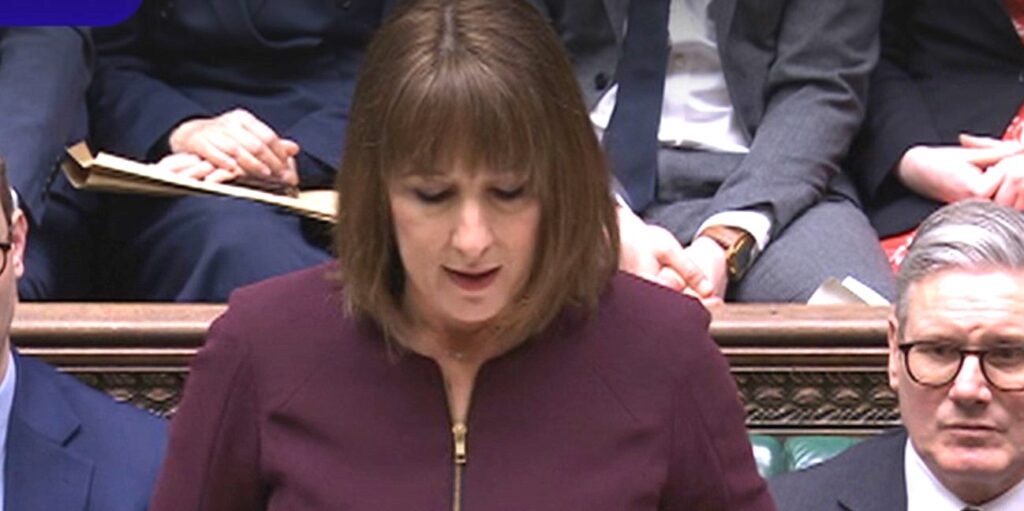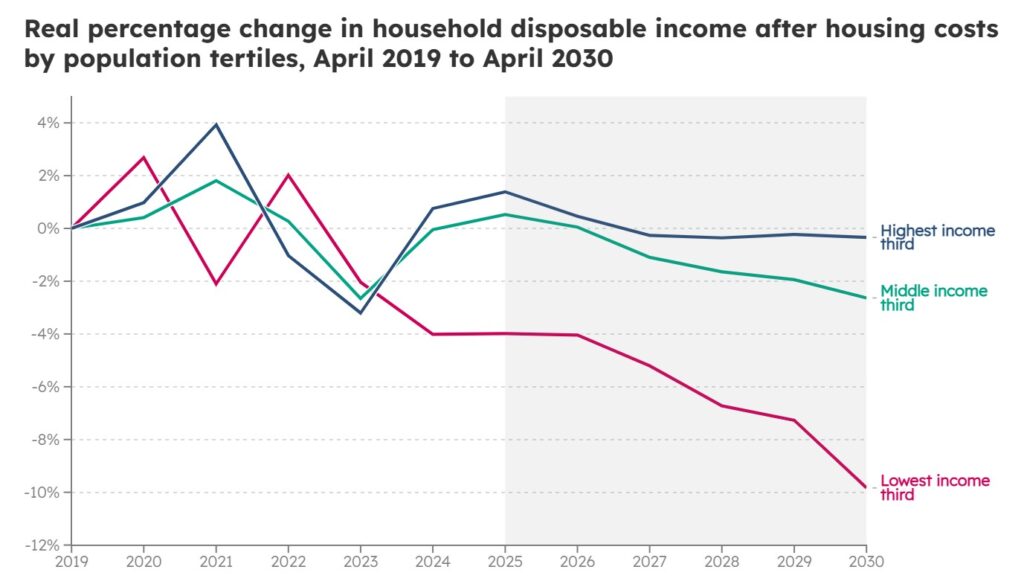 Editorial: trade unions must fight seriously against Labour austerity
Editorial: trade unions must fight seriously against Labour austerityThere can be no argument after Rachel Reeves’ Spring budget statement, that the Starmer government has moved decisively in the direction of austerity, even if Starmer and Reeves laughably deny the word. This week’s double hit against disabled people and the poorest in society is causing disquiet even among right wing Labour MPs, but it is to the trade union movement where we should now look, and demand serious opposition.
As socialists argued when the Tories did much the same thing for a decade and a half, the attacks on welfare and the least well-off are political choices, not economic necessities. The headline figures are worse than many on the left expected. Even according to the calculations of the DWP, a quarter of a million people, including 50,000 children, will be pushed into relative poverty.
In reality, the situation is likely to be far worse, because things like food, energy and rent consume a much greater proportion of the household spending of poorer families and these items are seeing the highest rates of inflation. The DWP estimates, according to the BBC, “that by 2029/30 there will be 3.2 million families – some current recipients and some future recipients – who will financially lose as a result of this package, with an average loss of £1,720 per year once inflation is taken into account”.
Calculations by the Joseph Rowntree Trust show the scale of the “living standards assault” on the poorest “who are set to see incomes fall twice as fast by end of Parliament.” (See chart below)
Closing tax loopholes
Meanwhile, Tax Justice UK has called for taxes on the most wealth, proposing ten measures that would raise £60bn. A 2% tax on wealth alone, they argue, could raise nearly £24bn. Writing in the Guardian, Helen Goodman, formerDepartment for Work and pensions minister, (2009-10), identified £35bn that could be raised from the rich, by closing tax loopholes.
Keir Starmer and Rachel Reeves turn a blind eye to the rich getting richer in the UK as elsewhere. According to Oxfam, “The UK has the highest proportion of billionaire wealth derived from “monopolies and cronyism”among G7 countries. In the UK, wealth climbed by £35m a day to £182bn in 2024”
“Total UK billionaire wealth increased by over £30 million A DAY last year” Oxfam points out, “Their wealth just keeps on growing while millions struggle…78% of the British public support a 2% wealth tax on net assets worth more than £10 million – that could raise £24 billion every year”.
None of this information (and there is more detail in Michael Robert’s article here) is in question for readers of Left Horizons and for activists within the broader labour movement. But many activists are asking, where is the opposition to these policies?
Four hundred Labour MPs
A number of Labour MPs, including some not considered to be on the left of the party, have expressed their opposition to the attack on disabled benefits and the measures announced in the Spring statement. But with over four hundred Labour MPs, we cannot hold much hope that there will be a serious rebellion against the trajectory of the Starmer government. Most of the PLP owe their candidacy and their careers – however short they turn out to be – to the right-wing cabal who control Labour’s NEC.
Across the country, there is a growing haemorrhage of members from the Labour Party, including councillors, who are understandably appalled by the growing accommodation of the Starmer cabinet to Conservative ideals and policies. The Labour Party under this leadership is facing its greatest post-war crisis and arguably the greatest crisis in its history. Is it little wonder that some people are asking, what is the Labour Party for?
There is no alternative movement at the moment to a party that is based, at grass roots level, on the trade unions. What will be important in the longer run will be the growing opposition among union rank and file members. Of those trade unions that issued a statement after Reeves spoke in the House of Commons, not a single one supported either the cuts in welfare to the disabled or the austerity announced in the Spring statement. The union leaders can do no other, with their members watching.
Despite the chaos in its upper echelons, the largest union on the left, Unite, issued the strongest response to Reeves. “Why is it always everyday people”, Unite asks “that have to pay the price? They paid the price after the 2008 crash, the Covid pandemic and are now expected to pay the price again. It is simply wrong”.
Parts of the Unite statement socialist would oppose
There is much in the Unite statement with which socialists would disagree, notably its apparent concern with the expansion of the defence industries, but at least it is clearly opposed to Labour’s accelerating austerity. “Instead of snatching crumbs from workers, pensioners and the disabled”, Unite says, “Labour should target the massive concentration of wealth built up by the richest one per cent. A wealth tax, as well as fairer taxes on corporate profiteers and the highest earners, would deliver far more money than any cuts to benefits and public services”.

Before her speech in the Commons, another left union leader, the general secretary of the FBU, Steve Wright, warned Reeves “not to repeat the mistakes of George Osborne and other Tory chancellors”, adding that“Workers struggling to afford the basics will not accept falling living standards from Labour”.
Because their own members and their members’ families are going to feel the cold draught of Labour’s austerity, even right wing trade union leaders are beginning to mutter some opposition to Starmer. A statement from the GMB noted that “14 years of Conservative chaos left deep scars across our country…but, it wasn’t those most in need who crashed the economy, and they shouldn’t be first in line to pay the bill for clearing up the mess”.
Some criticisms are faint at best
Likewise, a UNISON statement argued that “…the chancellor should stop backing herself into a corner with fiscal rules and borrow more to invest…Cuts to welfare and attacks on those least able to support themselves are not the right way to deliver a thriving economy, nor good quality public services”.
Some of these criticisms are faint, at best, and one of the ‘big four’ still firmly in the hands of the right wing, USDAW, issued no statement at all, even though its own policies, as determined by conferences, are firmly against any new austerity. We should not let the leaders of UNISON, USDAW and the GMB forget that it was their representatives on Labour’s NEC who backed Starmer every step of the way in his march to the right. They backed every bureaucratic ‘fix’ that entrenched the right wing, from the barring of Jeremy Corbyn’s candidacy to foisting right-wing candidates on reluctant constituencies up and down the country.
For those affiliated unions that are more outspoken in their criticisms, we would still have a question – how are you going to translate your opposition to Starmer’s policies into a fight inside the party?
The Unite statement was clear: “If the government pushes down a path of austerity mark two, where yet again workers and communities pay the price, Unite will not stand by and watch it happen. We will do all in our power to fight for the future of jobs, services and our communities.”
Empty words are no use without a campaign of action
What that has to mean, unless it is going to be empty words, is that Unite’s must launch an organised and effective campaign at all levels inside the party – locally, regionally and nationally, not least on Labour’s NEC – for a change of leadership and a change of direction. The union must mobilise its active members – potentially tens of thousands – to intervene in the party to fight against the dominance of the Starmer right wing. What applies to Unite applies equally to other affiliated unions.
A week before the special Spring statement, after the cuts were announced on disability benefits, the leader of the CWU union, Dave Smith, wrote the following: “The utter failure to table a policy platform that asks the richest in society and those who use the UK as a playground for their billionaire tax-dodging ventures to carry a greater burden, shows they have chosen to support elitism over the needs of the working class”.
The situation, he argues, “is heading straight into a democratic debate within our movement over the relationship between trade unions and the party we created.” We would hope and expect that Dave Ward takes this into TULO, the umbrella organisation of the affiliated unions, to fight for alternative policies.
The argument is not principally about personalities or individuals. It is about policies. Many Labour MPs, even on the right of the party, can see the ground moving under their feet, but their political outlook, like that of Rachel Reeves and the whole Labour cabinet, is wedded to capitalism and its inevitable limitations. They have no horizons beyond the ‘market’ economy.
The debate in the Labour Party to which Dave Ward alludes, must above all be a debate on policy. As long as the party bases its economic perspective on satisfying the OBR, the ‘financial markets’ and the needs of big business, then there is no alternative to austerity for the majority.
Labour has to break from this and advocate socialist measures. Urgent times demand urgent measures. There is massive popular support already for the renationalisation of utilities like water, energy and rail. Labour must ensure that these parts of the economy are publicly-owned and democratically run, but they should also add the banks, finance houses, manufacturing, land and transport infrastructure.
For a democratic plan of production
A publicly-owned and democratically run economy can develop a plan to use all national resources and wealth – we are still nominally the sixth richest country in the world – for the benefit of all. We can no longer put up with an economy in which the rich get richer and the poor get poorer. We have to fight in the party for policies that mean the living standards of working people are maintained, not undermined year by year.
If there were a serious alternative to the Labour Party, a new ‘left’ party that rested on the affiliation of millions of trade union members, then that would be a different situation altogether. But it doesn’t exist and isn’t on the horizon.
The trade union movement, if it really opposed to ‘Labour’ austerity, has to put its money where its mouth is and begin a serious fight for alternatives. If the union leaders do not realise it now, then they soon will – that such a fight has to mean different leaders and different policies, and a totally different direction.
 Editorial: trade unions must fight seriously against Labour austerity - There can be no argument after Rachel Reeves’ Spring budget statement, that the Starmer government has moved decisively in the direction of austerity, even if
Editorial: trade unions must fight seriously against Labour austerity - There can be no argument after Rachel Reeves’ Spring budget statement, that the Starmer government has moved decisively in the direction of austerity, even if Editorial: Israel resumes its killing and destruction in Gaza - As it turned out, the Israeli government did not even bother to find a pretext to break the ceasefire agreement with Hamas, which had been
Editorial: Israel resumes its killing and destruction in Gaza - As it turned out, the Israeli government did not even bother to find a pretext to break the ceasefire agreement with Hamas, which had been Editorial: Starmer goes full Tory on welfare benefits - In many articles and editorials in the past, Left Horizons has described Keir Starmer’s disastrous leadership of the Labour Party as “Tory-lite”. But in his
Editorial: Starmer goes full Tory on welfare benefits - In many articles and editorials in the past, Left Horizons has described Keir Starmer’s disastrous leadership of the Labour Party as “Tory-lite”. But in his Editorial: Trump turns the world upside down - There is a saying in politics that sometimes a year is like a day, passing by without much happening. Then a single day can have
Editorial: Trump turns the world upside down - There is a saying in politics that sometimes a year is like a day, passing by without much happening. Then a single day can have Editorial: Starmer now a recruiting sergeant for Farage - The Labour Party under Keir Starmer’s disastrous leadership is haemorrhaging votes in every single council by-election that is taking place, whether in England, Scotland or
Editorial: Starmer now a recruiting sergeant for Farage - The Labour Party under Keir Starmer’s disastrous leadership is haemorrhaging votes in every single council by-election that is taking place, whether in England, Scotland or
